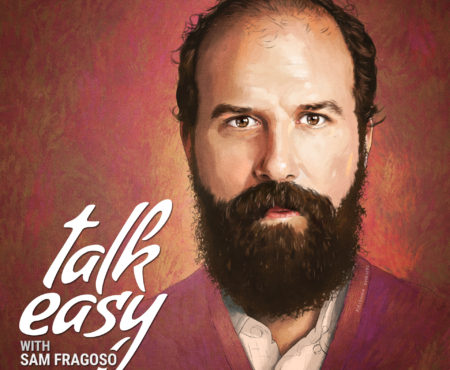Check out the new episode of Talk Easy with Sam Fragoso, where he interviews the film critic for the Chicago Tribune, Michael Phillips; as a teaser, enjoy the following transcript of a brief portion of the episode.
Sam Fragoso: At what point in writing about film did you feel like you were hitting your stride? Was there a year, or a review even, or a film where you’re like, “I know what I’m doing. I’m comfortable doing it. I know this is good writing.”
Michael Phillips: Right. That’s a good question. I’d say about the second or third year at the Weekly in Minneapolis, in my first sort of period as a film writer, I started–I never like that advice, “Find your voice.” What the hell good is that? You know, when people talk about developing your voice, that always seemed like such a bullshit piece of advice. It’s the most non-specific, unhelpful, generic advice you can give anybody.
SF: By the way, I appreciate you never giving me that advice.
MP: Well, I wouldn’t encourage you anyway! No, I would. Sometime around the second or third year at the weekly, I had just written enough at that point, a few dozen, maybe a hundred. You think, “Okay, this one works.” You go back and read it and, “Well, that one’s not bad. Why is that one a little better than this one?” It’s usually not a matter of anything other than specificity. You’re making your assertions and having your responses to something, complicated, simple, whatever. Love it, hate it, either way. In the middle most of the time. With certain reviews, they’re just simply more compellingly argued or better told if they’re kind of in story form or whatever, and it’s because those details are in there, that plenty of other reviews may be perfectly well-written but they just lack the detail that makes them really sing a year later when you reread it.
SF: You said most movies–you’re talking about reviews–you find yourself in the middle in terms of negativity and positivity, right?
MP: No more than anybody else.
SF: Sure, but my point to this is what is different with you is that the job requires you to write about a lot of movies.
MP: A lot of movies.
SF: You review, what, six, seven a week?
MP: Fewer than that, but you see six or seven a week and maybe you’re writing about let’s say four or five.
SF: Okay, that’s more than most people who write film criticism, I would say.
MP: Yeah, no, it’s not healthy.
SF: Oh, for sure no.
MP: It’s not healthy.
SF: How do you continue to make it interesting? Do you ever file something and you’re like, “I don’t like the movie very much but I don’t hate it.” It’s a sort of two, two-and-a-half star movie.
MP: Right, right, there’s a lot of them.
SF: And when you file those pieces, are you like, “Eh, I’m not proud of that?”
MP: Well, they’re hard to write. An interesting mixed review is the hardest thing to write, and I think if you’re intellectually honest you’re going to be writing a lot of them. If you see a hundred movies (let’s just take a round number, a hundred movies a year), two a week, twenty of those are going to really be–maybe fifteen, twenty of those–really good. Like, full price, absolutely happy to recommend them, at least for yourself. Twenty or thirty out of a hundred really not very good, not worth it even after two beers on the couch. You know, it’s just, it’s not, meh. That leaves about forty-five, fifty-five somewhere in the middle between inspiration and disaster, right? It’s true!
SF: I like that spectrum, by the way.
MP: It’s inspiration and disaster. I mean, how often do you come out of a movie, however you see it, and say, “It was okay.” So these are the movies I’m talking about. That’s 50% of your year. I don’t think I’m crazy.
SF: I guess, how do you not go crazy having to write so many-
MP: Well, you have to seize, in the review, on what is the reason why it’s that way. And there’s many different kinds of mixed results. Sometimes you get a very bad film that has one terrific supporting performer in it who’s saving the movie’s ass, or trying, all the way through. Other films are a much more kind of uniform combination of unambitious writing, zero style direction, and a medium good cast, you know what I mean? A more uniformly kind of “eh” experience, and that’s a different kind of review. You just have to make sure the reviews take the shape they should be taking, which typically doesn’t follow any kind of formula but it just–if there’s one performance that’s really only worth talking about in that film, go with that, lead with it, and then reread it after the first draft and say, “Okay, now does this review need a little furniture?” just to make it more of a review and less of an essay. Which is fine. Then you back in and you kind of think, okay, do I need a little more plot description? Just enough not to mystify them. Or do I need to unburden myself of this plot description because any jackass can write a plot description-heavy review.
Music provided by Vanilla.
You can subscribe to the show on iTunes.
Also, be sure to follow us on Facebook and Twitter.
Thank you for listening!




















